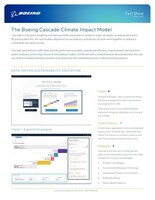-

-
pdf
SEATTLE, May 17, 2023 /PRNewswire/ -- In support of commercial aviation's path toward net zero carbon emissions, Boeing (NYSE: BA) today released the Boeing Cascade Climate Impact Model for public use. Cascade, a data modeling tool that identifies the effects of a range of sustainability solutions to reduce aviation's carbon emissions, is accessible on Boeing's new Sustainable Aerospace Together hub, www.sustainabilitytogether.aero.
Cascade examines the full life cycle of alternate energy sources for aviation – from production through distribution and use – and quantifies the ability to cut aviation's carbon emissions. Data modeling also measures airplane fleet renewal, operational efficiency, renewable energy sources, future aircraft and market-based measures as pathways to decarbonization.
"We created Cascade to serve as an industry tool that creates a common framework among aviation, energy, finance and policy," said Boeing Chief Sustainability Officer Chris Raymond. "By putting data first and sharing this model with the public, we are enabling collaboration, feedback and alignment across industry, government and others who work together to achieve a more sustainable aerospace future."
Key findings from Cascade's assessments include:
- The journey to net zero is dependent on the overall energy transition. Whether using sustainable aviation fuel (SAF), hydrogen or electricity, the energy and emissions associated with the production, distribution and storage of fuels must be minimized to achieve the most sustainable outcome.
- SAF will be the biggest contributor to reducing carbon emissions because it can be used in commercial airplanes flying today – both new and old. Since many jets flying today will be in service into and even beyond the 2040s, it is imperative to abate their emissions with SAF.
- While electric- and potentially hydrogen-powered aircraft will emerge in future decades, their contribution to emissions reduction will likely be limited through 2050 due to long timeframes for development and deployment and the magnitude of related infrastructure changes for airports and pipelines.
- Renewing fleets with best-in-class, fuel-efficient airplanes will significantly reduce emissions in coming years.
"Cascade helps airline operators, industry partners and policymakers see when, where and how different fuel sources affect their sustainability goals," said Neil Titchener, Cascade Program Leader. "Our industry has really hard questions ahead of us, we're going to have to make difficult choices. Cascade can be the conversation starter for how each decarbonization pathway can help us reach a more sustainable future."
Boeing announced the public release of Cascade at its first Sustainable Aerospace Together Forum, a conference convening leaders from commercial aviation, government and the energy and finance sectors. The event was streamed by FT Live and recorded sessions will be made available following the event.
Boeing also introduced the Cascade User Community, a working group that will provide feedback on new features, functionalities and application programming interfaces. The founding members of the Community are IATA, NASA, University of Cambridge's Aviation Impact Accelerator and the MIT Laboratory for Aviation and the Environment.
"The Cascade User Community will ensure the tool and data sources continue to get feedback and evolve for informed and effective discussions towards achieving net zero emissions by 2050," said Raymond.
In addition to hosting Cascade, the Sustainable Aerospace Together website provides resources and industry insights on aviation pathways to decarbonization. Try Cascade at www.sustainabilitytogether.aero.
As a leading global aerospace company, Boeing develops, manufactures and services commercial airplanes, defense products and space systems for customers in more than 150 countries. As a top U.S. exporter, the company leverages the talents of a global supplier base to advance economic opportunity, sustainability and community impact. Boeing's diverse team is committed to innovating for the future, leading with sustainability, and cultivating a culture based on the company's core values of safety, quality and integrity. Join our team and find your purpose at boeing.com/careers.
Contact
Lisa Maull
Boeing Sustainability Communications
+1 314 614-4583
lisa.a.maull@boeing.com
Boeing Media Relations
media@boeing.com
SOURCE Boeing
 USA
USA


